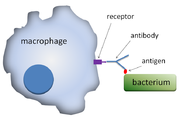
Opsonin
Encyclopedia

Antigen
An antigen is a foreign molecule that, when introduced into the body, triggers the production of an antibody by the immune system. The immune system will then kill or neutralize the antigen that is recognized as a foreign and potentially harmful invader. These invaders can be molecules such as...
for an immune response. However, the term is usually used in reference to molecules that act as a binding enhancer for the process of phagocytosis, especially antibodies, which coat the negatively-charged molecules on the membrane. Molecules that activate the complement system
Complement system
The complement system helps or “complements” the ability of antibodies and phagocytic cells to clear pathogens from an organism. It is part of the immune system called the innate immune system that is not adaptable and does not change over the course of an individual's lifetime...
are also considered opsonins. Phagocytic cells do not have an FC receptor for IgM, making IgM ineffective in assisting phagocytosis. However, IgM is extremely efficient at activating complement and is, therefore, considered an opsonin. Opsonins can also refer to molecules that target a cell for destruction through the action of Natural Killer cells
Natural killer cell
Natural killer cells are a type of cytotoxic lymphocyte that constitute a major component of the innate immune system. NK cells play a major role in the rejection of tumors and cells infected by viruses...
. Only opsonins that enhance phagocytic activity will be further described in this article.
Mechanism
Both the membrane of a phagocytosing cell and its target have a negative charge (zeta-potential), making it difficult for the two cells to come close together. Once the opsonins attach to the target, the negative charged is masked. Take note that the negative charge of the target doesn't disappear. The opsonin simply overrides the charge, making it easier for white blood cells (phagocytic cells), to undergo phagocytosis. During the process of opsonization (also, opsonisation), antigenAntigen
An antigen is a foreign molecule that, when introduced into the body, triggers the production of an antibody by the immune system. The immune system will then kill or neutralize the antigen that is recognized as a foreign and potentially harmful invader. These invaders can be molecules such as...
s are bound by antibody
Antibody
An antibody, also known as an immunoglobulin, is a large Y-shaped protein used by the immune system to identify and neutralize foreign objects such as bacteria and viruses. The antibody recognizes a unique part of the foreign target, termed an antigen...
or complement
Complement system
The complement system helps or “complements” the ability of antibodies and phagocytic cells to clear pathogens from an organism. It is part of the immune system called the innate immune system that is not adaptable and does not change over the course of an individual's lifetime...
molecules. Phagocytic cells express receptors, CR1 and Fc receptors, that bind opsonin molecules, C3b and antibody, respectively. With the antigen coated in these molecules, binding of the antigen to the phagocyte is greatly enhanced.
In fact, most phagocytic binding cannot occur without opsonization of the antigen.
Furthermore, opsonization of the antigen and subsequent binding to an activated phagocyte will cause increased expression of complement receptors on neighboring phagocytes.
Examples
Examples of opsonin molecules include:- Antibodies: IgG and IgMIGMIGM as an acronym or abbreviation can refer to:* Immunoglobulin M , the primary antibody against A and B antigens on red blood cells* International Grandmaster, a chess ranking* intergalactic medium* Intragroup medium - see: Intracluster medium...
- Components of the complement system: C3bC3bC3b is the larger of two elements formed by the cleavage of complement component 3. C3b covalently bonds to microbial cell surfaces within an organism's body. This leads to the production of surface-bound C3 convertase and thus more C3b components. Bound C3b also aids in opsonization of the microbe...
, C4b, and iC3bIC3biC3b is a protein molecule that is used in medical research because of its ability to bind to specific target cells. This is useful for basic research, and in some cases it is possible to get the immune system to attack those cells, thus opening the possibility of new cancer treatments.iC3b is a... - Mannose-binding lectin (initiates the formation of C3b)
The most important are IgG and C3b.
See also
- Antibody opsonizationAntibody opsonizationIs the process by which a pathogen is marked for ingestion and destruction by a phagocyte. Opsonization involves the binding of an opsonin, e.g., antibody, to a receptor on the pathogen's cell membrane. After opsonin binds to the membrane, phagocytes are attracted to the pathogen...
The example of opsonine is the lectin pathway. It is a type of the complement system. Mannan-binding lectin
Mannan-binding lectin
Mannose-binding lectin , also named mannose- or mannan-binding protein , is an important factor in innate immunity.-Function:MBL belongs to the class of collectins in the C-type lectin superfamily, whose function appears to be pattern recognition in the first line of defense in the pre-immune...
proteins play a major role in activation of this pathway. Opsonin belongs to the same family as C1q, a family called the collectins.

